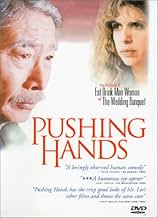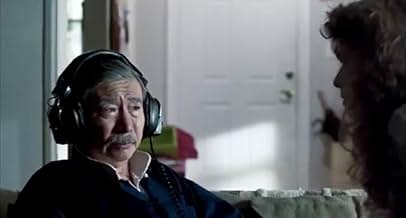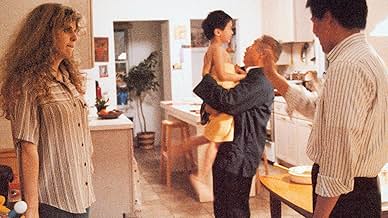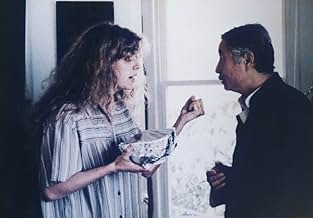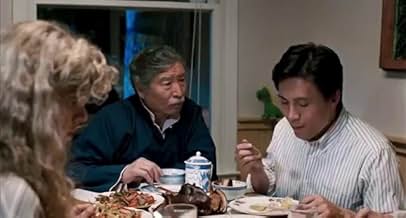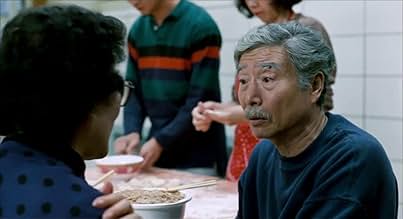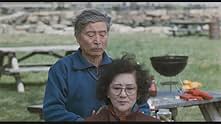IMDb-BEWERTUNG
7,2/10
5142
IHRE BEWERTUNG
Die ganze Zeit versucht Meister Chu, seinen Platz in der fremden amerikanischen Welt zu finden.Die ganze Zeit versucht Meister Chu, seinen Platz in der fremden amerikanischen Welt zu finden.Die ganze Zeit versucht Meister Chu, seinen Platz in der fremden amerikanischen Welt zu finden.
- Auszeichnungen
- 6 Gewinne & 7 Nominierungen insgesamt
Bozhao Wang
- Alex Chu
- (as Ye-tong Wang)
Empfohlene Bewertungen
Tuei Sho(Pushing Hands) is Ang Lee's first film after graduation, and the first episode of his "Triad of Father." In spite of its status as an early work, it manifests subtlety, elegance and articulation in narration style constantly seen in his latter works. Everyone, whether seen this film or not, can tell that it's about the bondage and gap of affection, relation and interaction within family, but it's more than that. It also tells about culture, not only the apparent differentiation, but the shift within a man's life, the time and the whole modern history of China. If you understand Chinese(language, culture and history), it is delicately overwhelming. If not, it's still amiable and a bit exotic. Tuei Sho is so worth viewing and contemplating again and again.
Sihung Lung, the actor who played Master Chu, the aging tai chi master, gave a very convincing and sincere performance in this film. It was no wonder that he won the Golden Horse (Taiwan's equivalent for the Oscars) for Best Actor in this film. His performance was extremely touching, as tears jerked into my eyes as I see an aging and traditional Chinese father trying to get along with his westernized family while also trying to adjust to life in a new place and culture. The film encourages people, especially new immigrants, to emphasize and put themselves in their parents' shoes. Try to understand how difficult it is for them to come and settle in a new place and try not to push them away. Be patient with them, take a step back and everything may be better.
The movie title, "Pushing Hands", is very appropriate, as this is the term for an exercise in tai chi in which a person achieves balance by giving up balance. In this non-aggressive exercise between 2 people, a person offers no resistance at all to the pressure or push that the other person is exerting and keeps borrowing this strength until they feel they have fused into one and thus have achieved harmony. This was what Master Chu did. Although his daughter-in-law kept misunderstanding him, causing much discontent and eventually got his son to try to sent him away, he offered no resentment or a temper tantrum. He simply walked away gracefully. This action caused his son to appreciate him and remember why he got his father to live together in the first place in a tear jerking scene and finally they worked out a solution. They decided to give each other space by living separately instead of pushing each other away. In the end everyone was much happier, as even the daughter-in-law learned to accept the father, symbolized by her decorating the guest room for him and asking the question if he would ever visit. The father achieved the balance that he seek in Tai-Chi.
Ang Li is simply amazing and sensational. He did what he could with the limited budget and created a very warm and tear jerking film. Although this film was not the highest quality (the version I saw was very unclear and skips sometimes) and it could feel slow at times, especially the beginning sequence, the film was a great work in directing. The film picked up its pace after the slow beginning without any big fighting scenes or explosions and never felt boring afterwards. Also, from the beginning sequence, where he was able to show the dissension and gap between the daughter-in-law and the father by using just different scenes and visuals, to scenes throughout the film where he used lighting and different camera angles to show the internal pain and sadness that the father experience, it was, simply put, a great piece of art considering the budget. It showcased the talent of Li and gave the audience a glimpse of the man who would bring us the memorable Couching Tiger, Hidden Dragon.
The movie title, "Pushing Hands", is very appropriate, as this is the term for an exercise in tai chi in which a person achieves balance by giving up balance. In this non-aggressive exercise between 2 people, a person offers no resistance at all to the pressure or push that the other person is exerting and keeps borrowing this strength until they feel they have fused into one and thus have achieved harmony. This was what Master Chu did. Although his daughter-in-law kept misunderstanding him, causing much discontent and eventually got his son to try to sent him away, he offered no resentment or a temper tantrum. He simply walked away gracefully. This action caused his son to appreciate him and remember why he got his father to live together in the first place in a tear jerking scene and finally they worked out a solution. They decided to give each other space by living separately instead of pushing each other away. In the end everyone was much happier, as even the daughter-in-law learned to accept the father, symbolized by her decorating the guest room for him and asking the question if he would ever visit. The father achieved the balance that he seek in Tai-Chi.
Ang Li is simply amazing and sensational. He did what he could with the limited budget and created a very warm and tear jerking film. Although this film was not the highest quality (the version I saw was very unclear and skips sometimes) and it could feel slow at times, especially the beginning sequence, the film was a great work in directing. The film picked up its pace after the slow beginning without any big fighting scenes or explosions and never felt boring afterwards. Also, from the beginning sequence, where he was able to show the dissension and gap between the daughter-in-law and the father by using just different scenes and visuals, to scenes throughout the film where he used lighting and different camera angles to show the internal pain and sadness that the father experience, it was, simply put, a great piece of art considering the budget. It showcased the talent of Li and gave the audience a glimpse of the man who would bring us the memorable Couching Tiger, Hidden Dragon.
Love the natural performances of the two elders in this film (Sihung Lung and Wang Lai), and at its best, it touches on the real struggles of getting older in ways that tug the heartstrings. I was less impressed by the character and performance of the daughter-in-law, and the culture clash aspects of the story seemed a little clunky. There was a fair bit of melodrama here, some of which seemed sloppy, and some of which was pretty humorous (the old man channeling his powers and not being moveable by a crowd of guys in the kitchen comes to mind). It's uneven but engaging, and has gentle charm. Worth seeing.
10bagua-2
Rarely have I seen the highest level of martial arts, internal kung-fu, portrayed in it's proper perspective. It is hard these days for people to realize that 'soft' style kung-fu will enable an old man to defeat many young men without much effort. With all the silly 'wire-fu' out there in the movies most people have no idea that there is a subtle way to defeat strength through 'chi energy' power lines.
There is no question that Ang Lee has the ability to put kung-fu back at the top of the martial art world. Through his well thought out story line and his perfect blend of drama and comedy he has taken a deep look at the struggle that exists today for thousands of people as they care for their elderly parents. This is truly a movie that can bond many generations.
There is no question that Ang Lee has the ability to put kung-fu back at the top of the martial art world. Through his well thought out story line and his perfect blend of drama and comedy he has taken a deep look at the struggle that exists today for thousands of people as they care for their elderly parents. This is truly a movie that can bond many generations.
I do really love how when it comes to Ang Lee, there are no two films he's made that feel completely similar. He's up there with Spielberg when it comes to covering a wide variety of genres and tones, and maybe slightly more consistent, too. Pushing Hands was his debut, and while it reminded me a little of Eat Drink Man Woman in parts, it was still pretty different overall, in terms of its story and how it wasn't afraid to present a slightly heightened reality at times, too.
This does mean it's not as well balanced as Lee's 1994 film (and it doesn't hit as hard emotionally, either), but it does stand as a strong debut, and a film I mostly enjoyed quite a bit. It's a tiny bit rough around the edges, but only when you compare it to what Ang Lee was capable of doing just a few years later. Considering he was starting out here, it's a very confident and well-made debut.
Not all the humour hits, and some scenes end a bit abruptly. And as mentioned, the detours it almost takes into becoming a martial arts movie are unexpected (but will probably end up being one of the most memorable things about it). At its core though, it's a movie about family drama and the difficulties of growing old, and I think when it focuses on those things, it's quite effective. Lee's an empathetic filmmaker, and you always feel something for his main characters, and even in his debut, that's no exception.
While it's not one of his best films, I think it's still pretty easy to recommend and enjoy. I look forward to watching The Wedding Banquet soon, as I think that was his second film, and I've heard the general consensus is it's almost as good as the excellent Eat Drink Man Woman.
This does mean it's not as well balanced as Lee's 1994 film (and it doesn't hit as hard emotionally, either), but it does stand as a strong debut, and a film I mostly enjoyed quite a bit. It's a tiny bit rough around the edges, but only when you compare it to what Ang Lee was capable of doing just a few years later. Considering he was starting out here, it's a very confident and well-made debut.
Not all the humour hits, and some scenes end a bit abruptly. And as mentioned, the detours it almost takes into becoming a martial arts movie are unexpected (but will probably end up being one of the most memorable things about it). At its core though, it's a movie about family drama and the difficulties of growing old, and I think when it focuses on those things, it's quite effective. Lee's an empathetic filmmaker, and you always feel something for his main characters, and even in his debut, that's no exception.
While it's not one of his best films, I think it's still pretty easy to recommend and enjoy. I look forward to watching The Wedding Banquet soon, as I think that was his second film, and I've heard the general consensus is it's almost as good as the excellent Eat Drink Man Woman.
Wusstest du schon
- PatzerThe son, Alex, has physiognomy that is unmistakably that of someone Beijing, and the actor speaks with a Beijing accent, but the father, who demonstrates Taiwanese cultural practices, has the appearance of someone from farther south, such as near Shanghai. Regardless of whom the father might have married, the couple could not have produced a child with such Northern characteristics. This is a casting error more than a character error.
Top-Auswahl
Melde dich zum Bewerten an und greife auf die Watchlist für personalisierte Empfehlungen zu.
- How long is Pushing Hands?Powered by Alexa
Details
- Erscheinungsdatum
- Herkunftsländer
- Sprachen
- Auch bekannt als
- Pushing Hands
- Drehorte
- Produktionsfirmen
- Weitere beteiligte Unternehmen bei IMDbPro anzeigen
Box Office
- Budget
- 400.000 $ (geschätzt)
- Bruttoertrag in den USA und Kanada
- 152.322 $
- Eröffnungswochenende in den USA und in Kanada
- 9.567 $
- 4. Juni 1995
- Weltweiter Bruttoertrag
- 152.322 $
Zu dieser Seite beitragen
Bearbeitung vorschlagen oder fehlenden Inhalt hinzufügen

Oberste Lücke
By what name was Schiebende Hände (1991) officially released in India in English?
Antwort

